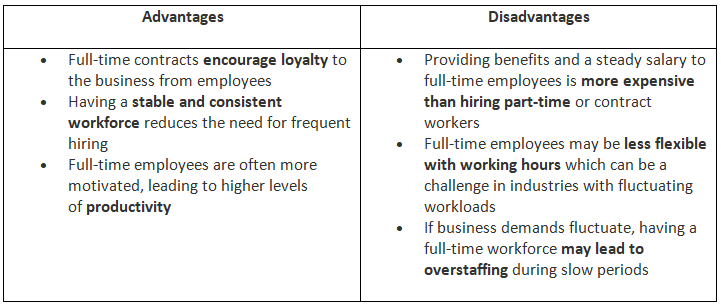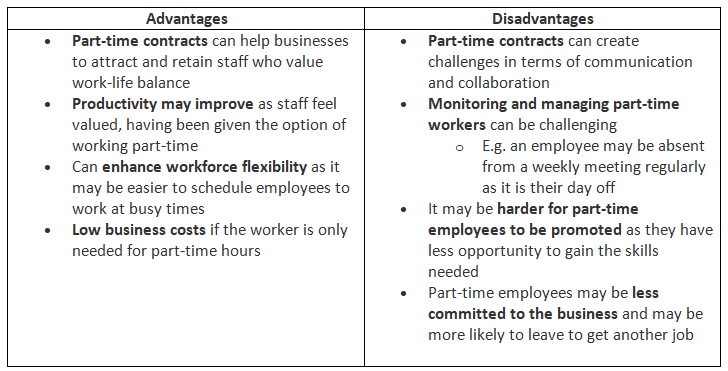Class 10 Exam > Class 10 Notes > Business Studies for GCSE/IGCSE > Part-time Versus Full-time
Part-time Versus Full-time | Business Studies for GCSE/IGCSE - Class 10 PDF Download
Part-time or Full-time Contracts
- Businesses can hire staff on various types of contracts, such as part-time and full-time.
- Part-time roles typically involve working between 1 and 30 hours per week.
- Full-time employees usually work 35 hours per week.
- Flexible working arrangements aim to create a culture where employees can adopt different working patterns, including full-time, part-time, zero-hour contracts, and remote work.
Evaluating Full-time Contracts
- Hiring full-time workers can be costly, but it brings substantial advantages to a business.
The Impact of Full-time Contracts on a Business

Evaluating Part-time Contracts
The Impact of Part-time Contracts on a Business

The document Part-time Versus Full-time | Business Studies for GCSE/IGCSE - Class 10 is a part of the Class 10 Course Business Studies for GCSE/IGCSE.
All you need of Class 10 at this link: Class 10
|
70 videos|93 docs|26 tests
|
FAQs on Part-time Versus Full-time - Business Studies for GCSE/IGCSE - Class 10
| 1. What are the key points to consider when evaluating full-time contracts? |  |
Ans. When evaluating full-time contracts, it is important to consider factors such as salary, benefits, working hours, job security, career advancement opportunities, and work-life balance.
| 2. What factors should be taken into account when evaluating part-time contracts? |  |
Ans. When evaluating part-time contracts, it is important to consider factors such as hourly rate, flexibility of working hours, availability of benefits, job security, career advancement opportunities, and the impact on work-life balance.
| 3. How does one determine whether a full-time contract or a part-time contract is more suitable for their individual circumstances? |  |
Ans. To determine whether a full-time or part-time contract is more suitable, individuals should assess their financial needs, career goals, personal commitments, and preferences for work-life balance. They should also consider the availability of part-time opportunities in their desired field.
| 4. What are the advantages of working on a full-time contract versus a part-time contract? |  |
Ans. Working on a full-time contract typically offers more stability, higher salary potential, access to benefits such as healthcare and paid leave, and opportunities for career advancement. On the other hand, part-time work may provide greater flexibility and work-life balance.
| 5. How can individuals make a successful transition from part-time to full-time employment or vice versa? |  |
Ans. To make a successful transition from part-time to full-time employment or vice versa, individuals should communicate their intentions with their employer, assess the impact on their finances and personal life, and consider any training or skill development needed for the new role. It is also important to review and negotiate the terms of the new contract before making the switch.
Related Searches
















